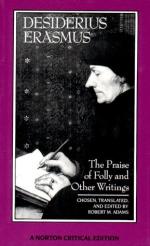|
This section contains 7,732 words (approx. 26 pages at 300 words per page) |

|
SOURCE: Patrides, C. A. “Erasmus and More: Dialogues with Reality.” Kenyon Review 8, no. 1 (winter 1986): 34-48.
In this essay, Patrides compares Erasmus's Praise of Folly and other works to the Utopia of his friend and peer Thomas More, contrasting the playful approach of the former with the darker tones of the latter.
Sancte Socrates, ora pro nobis!”—“Saint Socrates, pray for us!” So exclaims a character in one of Erasmus's colloquies, and, ever since, readers have been either dazzled by the boldness of the great humanist or distressed by the limitations of his spiritual horizons. But perhaps we are not often enough inclined to be amused, unprepared as we are to grant readily that the intent of Erasmus, here as elsewhere, was to delineate a vision essentially dependent on a lusory apprehension of reality.
The notorious exclamation just quoted occurs in a particular colloquy, “The Godly Feast,” which Erasmus...
|
This section contains 7,732 words (approx. 26 pages at 300 words per page) |

|


